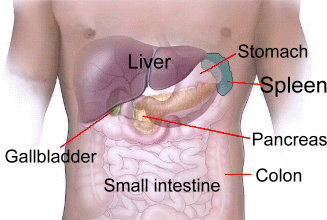  The spleen is a small organ inside your left rib cage, just above the stomach. In adults, the spleen is about the size of an avocado. It's part of the lymphatic system (which is part of the immune system). The spleen stores and filters blood and makes the white blood cells and antibodies that protect you from infections.
The spleen is a small organ inside your left rib cage, just above the stomach. In adults, the spleen is about the size of an avocado. It's part of the lymphatic system (which is part of the immune system). The spleen stores and filters blood and makes the white blood cells and antibodies that protect you from infections.
There are two parts of the spleen that each do different jobs. The white pulp produces white blood cells. The red pulp acts like a filter, removing waste from the blood. Your spleen: Many disorders, conditions, injuries and diseases can cause problems in the spleen. These problems include: Enlarged spleen (splenomegaly): An enlarged spleen can cause pain and an uncomfortable feeling of fullness, even if you havenít eaten much. Splenomegaly is a dangerous condition because the spleen can rupture or bleed. The spleen can become enlarged from: of the body that spread to the spleen Functional asplenia: This condition happens when your spleen doesnít work as it should, overreacting and destroying healthy red blood cells. Destroying too many blood cells can increase the risk of infection and lead to bruising and bleeding. Functional asplenia can result from: Damaged or ruptured spleen: Your spleen can rupture from injuries and trauma. Car accidents and blows to the abdomen are common causes of spleen damage. This life-threatening injury can cause severe internal bleeding. Symptoms of a ruptured spleen include: Can you live without a spleen? It is possible, and quite common. Sometimes healthcare providers perform surgery to remove the spleen (splenectomy) because itís damaged or diseased. Without the spleen, the liver takes over many of the spleenís duties. People who live without a spleen have a higher risk of infection, as the body has a harder time protecting itself from bacteria and viruses. Vaccinations and daily antibiotics will help to prevent infections. |